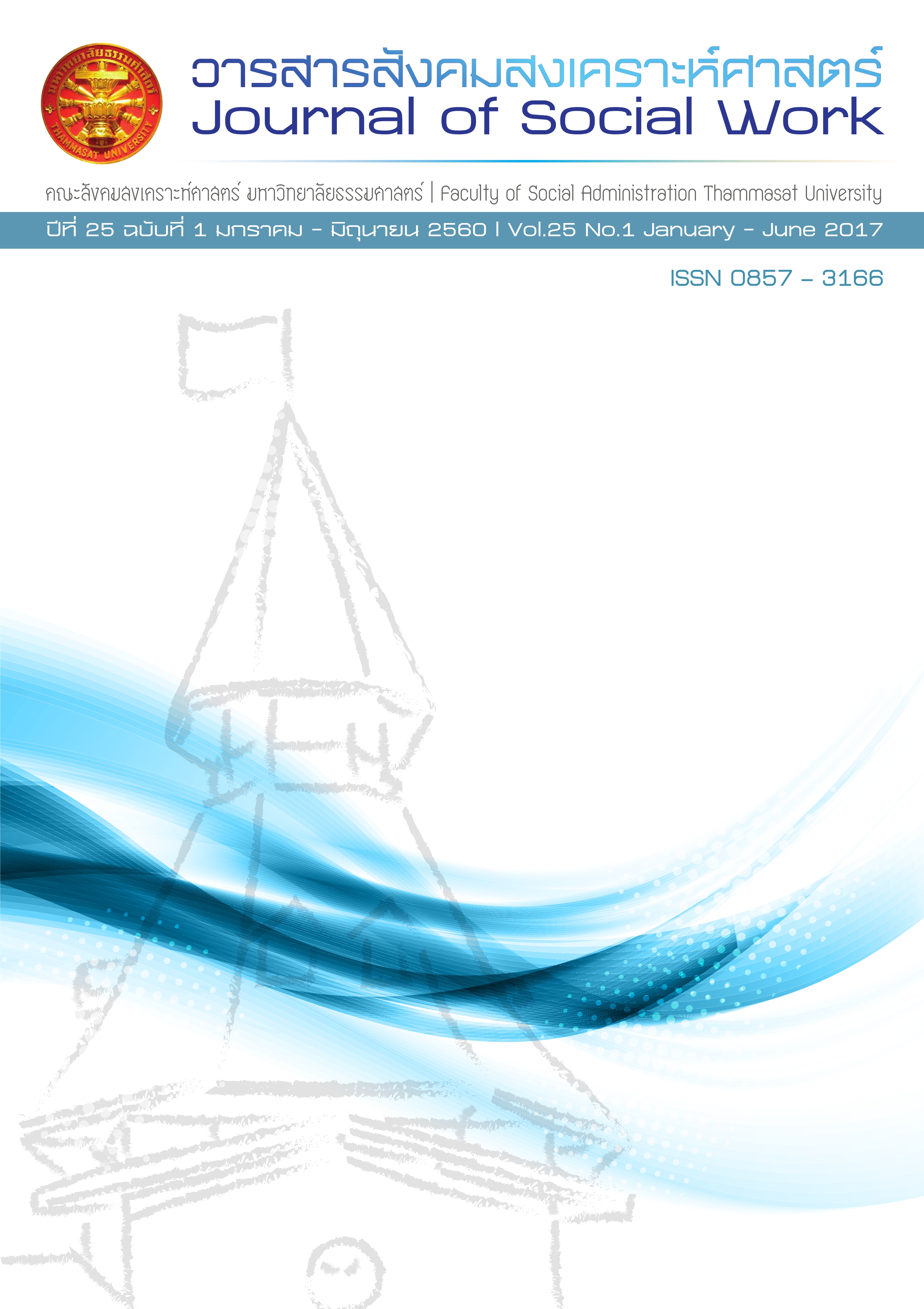Self-efficacy, Job Demands-Job Resources and Burnout with Perception of Organizational Justice as a Moderating Variable
Keywords:
Self-efficacy, Job demands-Job resources, Perception of Organizational Justice, BurnoutAbstract
This research is to study self-efficacy, job demands-job resources, and burnout of teachers with perception of organizational justice as a moderating variable. Sample consists of 180 registered teachers of a private school, Samut prakan province. The results of the study are as follow. :
1. Analysis of Pearson’s correlation:
1.1 Overall self-efficacy negative correlate significantly with overall burnout (r = -.663 , p < 0.01).
1.2 Overall job demands-job resources correlate significantly with overall burnout (r = -.458 , p < 0.01).
2. Analysis of perception of organizational justice as moderating variable
2.1 Overall perception of organizational justice is a moderating variable between Overall job demands and overall burnout (B = .463 , t = 2.572 , p < 0.05).
2.2 Overall perception of organizational justice is a moderating variable between Overall job resources and overall burnout (B = -.271 , t = -3.253 , p < 0.01).
References
ชัยยุทธ กลีบบัว. (2552). การพัฒนาโมเดลเชิงสาเหตุของความเหนื่อยหน่ายในการทำงาน: การประยุกต์โมเดลความต้องการ-ทรัพยากรของงาน. วิทยานิพนธ์ปริญญามหาบัณฑิต, จุฬาลงกรณ์มหาวิทยาลัย, คณะจิตวิทยา, สาขาวิชาจิตวิทยาอุตสาหกรรมและองค์การ.
ตุลยา เหรียญทอง. (2550). ความสัมพันธ์ระหว่างการรับรู้ความยุติธรรมในองค์การ พฤติกรรมการเป็นสมาชิกที่ดีขององค์การ และความเครียดในการทำงาน : กรณีศึกษาพนักงานการไฟฟ้าฝ่ายผลิตแห่งประเทศไทยสำนักงานใหญ่ส่วนกลาง. งานวิจัยส่วนบุคคลปริญญามหาบัณฑิต, มหาวิทยาลัยธรรมศาสตร์, คณะศิลปศาสตร์, สาขาวิชาจิตวิทยาอุตสาหกรรมและองค์การ.
ธิดา เขื่อนแก้ว. (2554). ความสัมพันธ์ระหว่างการรับรู้ความยุติธรรมในองค์การ การรับรู้การสนับสนุนจากองค์การ และพฤติกรรมการเป็นสมาชิกที่ดีขององค์การของพนักงานระดับปฏิบัติการ : กรณีศึกษาโรงงานผลิตชิ้นส่วนอิเล็กทรอนิกส์แห่งหนึ่ง. งานวิจัยส่วนบุคคลปริญญามหาบัณฑิต, มหาวิทยาลัยธรรมศาสตร์, คณะศิลปศาสตร์, สาขาวิชาจิตวิทยาอุตสาหกรรมและองค์การ.
นวลพรรณ ชื่นประโยชน์. (2554). ความเหนื่อยหน่ายในการทำงาน ความผูกพันในงานและความสามารถในการฟันฝ่าอุปสรรค ต่อผลการปฏิบัติงานของพนักงานสินค้าเกษตรส่งออก.งานวิจัยส่วนบุคคลปริญญามหาบัณฑิต, มหาวิทยาลัยธรรมศาสตร์, คณะศิลปศาสตร์, สาขาวิชาจิตวิทยาอุตสาหกรรมและองค์การ.
เนาวรัตน์ อิ่มใจ. (2556). การศึกษาความสัมพันธ์ระหว่างความสามารถในการเผชิญและฟันฝ่าอุปสรรค การสนับสนุนทางสังคมและความเหนื่อยหน่ายในการทำงาน: กรณีศึกษาบุคลากรสังกัดบัณฑิตวิทยาลัยมหาวิทยาลัยในกำกับของรัฐแห่งหนึ่ง. งานวิจัยส่วนบุคคลปริญญามหาบัณฑิต, มหาวิทยาลัยธรรมศาสตร์คณะศิลปศาสตร์, สาขาวิชาจิตวิทยาอุตสาหกรรมและองค์การ.
พีรยา เชาวลิตวงศ์. (2554). ความสัมพันธ์ระหว่างบุคลิกภาพห้าองค์ประกอบ การรับรู้ความสามารถของตนเอง และพฤติกรรมความปลอดภัยในการทำงาน : กรณีศึกษาพนักงานฝ่ายช่างสายการบินแห่งหนึ่ง. งานวิจัยส่วนบุคคลปริญญามหาบัณฑิต, มหาวิทยาลัยธรรมศาสตร์, คณะศิลปศาสตร์, สาขาวิชาจิตวิทยาอุตสาหกรรมและองค์การ.
สุวภา สังข์ทอง. (2554). การศึกษาความสัมพันธ์ระหว่างพฤติกรรมการเผชิญความเครียด การสนับสนุนทางสังคม และความเหนื่อยหน่ายในการทำงาน กรณีศึกษา : หน่วยงานราชการแห่งหนึ่งในสังกัดกรุงเทพมหานคร. งานวิจัยส่วนบุคคลปริญญามหาบัณฑิต, มหาวิทยาลัยธรรมศาสตร์, คณะศิลปศาสตร์, สาขาวิชาจิตวิทยาอุตสาหกรรมและองค์การ.
สุวิมล นันทปรีชาวงศ์. (2552). บุคลิกภาพตามแนวทฤษฎีเชาวน์จิตอัจฉริยะ รูปแบบตามอารมณ์ตามงาน ความเหนื่อยหน่ายในการทำงาน ที่มีผลต่อความพึงพอใจในการทำงาน และพฤติกรรมการให้บริการของพนักงานต้อนรับส่วนหน้าโรงแรมในเขตกรุงเทพมหานคร. วิทยานิพนธ์ปริญญามหาบัณฑิต, มหาวิทยาลัยธรรมศาสตร์, คณะศิลปศาสตร์, สาขาวิชาจิตวิทยาอุตสาหกรรมและองค์การ.
Bakker, A. B., Demerouti, E., & Euwema, M.C. (2005). Job resources buffer the impact of job Demands on burnout. Journal of Occupational Health Psychology, 10, 170-180.
Christian Korunka, Bettina Kubicek, Wilmar Schaufeli & Peter Hoonakker. (2009). Work engagement and burnout: Testing the robustness of the Job Demands-Resources model. The Journal of Positive Psychology. 4(3). 243-255.
Evangelia Demerouti, Arnold Bakker, Friedhelm Nachreiner & Wilmar B. Schaufeli. (2001). The Job Demands-Resource Model of Burnout. Journal of Applied Psychology. 86(3). 499-512.
Jari J. Hakanena, Wilmar B. Schaufelib & Kirsi Ahola. (2008). The Job Demands-Resources model: A three-year cross-lagged study of burnout, depression, commitment, & work engagement. Work & Stress, 22, 224-241.
Karin Proost, Peter Verboon & Joris van Ruysseveldt. (2015). Organizational justice as buffer against stressful job Demands. Journal of Managerial Psychology, 30, 487 – 499.
Labone E. (2002). The Role of teacher efficacy in the development & prevention of teacher burnout. Paper Presented at the Annual Meeting of the Australian Association for Research in Education, 1-5
Liljegren M & Ekberg K. (2009). The associations between perceived distributive, procedural, and interactional organizational justice, self-rated health and burnout. (From: http://www.ncbi.nlm.nih.gov/pubmed/19597284)
Mona Tabatabaee Yazdi, Khalil Motallebzadeh, Hamid Ashraf. (2014). The Role of Teacher's Self-efficacy as a Predictor of Iranian EFL Teacher's Burnout. Academy Publisher Manufactured in Finland.5(5).1198-1204. (From : http://www.academypublication.com/issues/past/jltr/vol05/05/28.pdf)
Nahrgang, Jennifer D., Morgeson, Frederick P. & Hofmann, David A. (2011). Safety at work: A meta-analytic investigation of the link between job demands, job resources, burnout, engagement, and safety outcomes. Journal of Applied Psychology. 96(1). 71-94.
Najaf Aghaei, Keivan Moshiri & Shahnaz Shahrbanian. (2012). Relationship between organizational justice & job burnout in employees of Sport & Youth Head Office of Tehran. Applied Science Research, 3 (4), 2438-2445.
S Rothmann, K Mostert, M Strydom. (2006). A Psychometric Evaluation of the Job Demands-resources scale in South Africa. SA Journal of Industrial Psychology, 32 (4), 76-86.
Tae Kuen Kim, Phyllis Solomon & Cinjae Tang. (2010). Organizational Justice and Social Workers' Intentions to Leave Agency Positions. Social Work Research. 1-9.
ZhongZhen. (2011). A Study on the Relationship between Working Stress, Organizational Justice and Job Burnout of Vocational College Teachers. (From: http://www.topresearch.org/showinfo-229-856301-0.html)
Downloads
Published
How to Cite
Issue
Section
License
The manuscripts published in the Social Work Journal is the copyright of the Social Work Journal, Thammasat University
Any article or opinion appeared in the Social Work Journal will solely be under the responsibility of the author The Faculty of Social Administration, Thammasat University and the editors do not need to reach in agreement or hold any responsibility.



